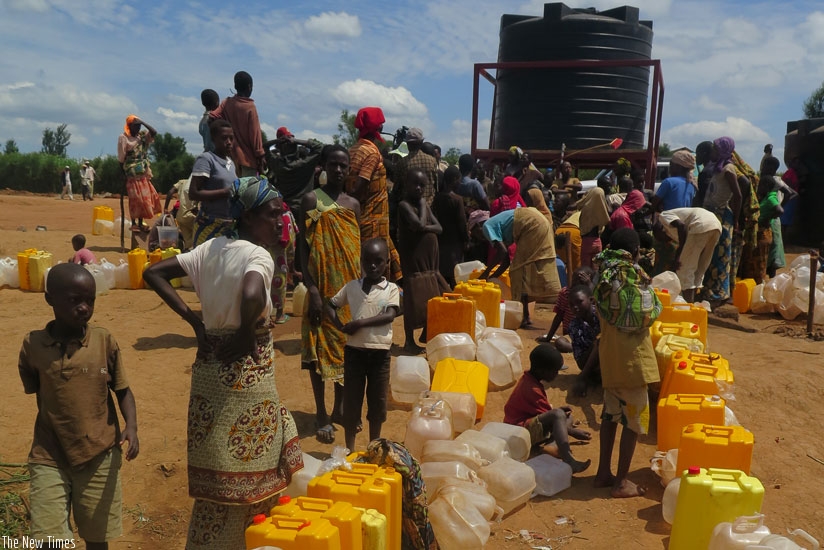The Ministry of Natural Resources has unveiled grand plans expected to ensure sustainable water use in order to meet the various water related development targets in agriculture, energy, in homes and other areas.


The Ministry of Natural Resources has unveiled grand plans expected to ensure sustainable water use in order to meet the various water related development targets in agriculture, energy, in homes and other areas.
The country faces an annual water shortfall of about 330 cubic meters.
The plan which falls under the medium and long term government strategies like vision 2020, EDPRS2 and other specific sector strategies is informed by the fact that Rwanda faces a challenge related to water scarcity with current water availability per capita put at about 670 cubic meters per year.
The Ministry of Natural Resources acknowledges that it is far below the standard threshold of 1,000 cubic meters annually.
According to the ministry, the master plan will make it possible: to promote water storage though multi-purpose dams and rainwater harvesting; and to strengthen the water resources governance especially at catchment level.
It will also help establishing an effective water allocation framework and in investing in water resources protection and other sustainable land management measures to maximize ground water recharge by reducing the runoff and also to improve the water quality.
The Minister of Natural Resources Vincent Biruta, on Thursday, took to twitter to shed light on the novel plan and he indicated that the management of water resources is done by catchment and Rwanda has nine main catchments and 20 sub catchments.
Catchment means an area contributing the water runoff to a common point like a river or a lake.
Biruta said: "The main strategies under the water master plan include multipurpose dams, rain water harvesting and ground water recharge through afforestation and radical terracing.
"Multipurpose dams have more than one use. They can be used for electricity generation, irrigation and domestic supply. Multipurpose dams are being considered on Muvumba, Nyabarongo and Akanyaru”.
Implementation of the master plan is already underway.
Ongoing projects include design of the first mufti-purpose dam in Rwanda on river Muvumba in eastern Province.
Official figures indicate that Rwanda receives a total rainfall of 27.505 billion cubic meters per annum. The total renewable water resources is 6.826 billion cubic meters per annum while the ground water recharge is 4.554 billion cubic meters per annum.
The ministry also says Rwanda is categorized as an "economically water scarce country.”
However, it is also noted that it is also a country with potential for having enough renewable water resources like high rainfall but needs to make significant improvements to make such resources available for use like through surface water storage, underground water recharge through sustainable land management, and water supply infrastructures.
Francois-Xavier Tetero, Director for Water Resources Regulation at the Rwanda Natural Resources Authority, told The New Times that although the plan looks good on paper, it can only serve its purpose if it is fast tracked and implemented.
Sometimes, he admitted, good plans only end up gathering dust on shelves, something the relevant authorities should not allow to happen in this particular case. He said the successful implementation of the master plan for water resources will lead to a consistent water supply for all the water using sectors such as domestic water supply, irrigation, and hydropower.
Rwf66 billion budget
Tetero said the budget needed to implement the water resources master plan is estimated at Rwf 66 billion over the 25-year planning period.
"The commitment expressed by the government for water resources management through the Medium Term Expenditure Framework (MTEF, 2015-2018) is about 1.5 billion Rwandan francs,” he added.
In addition, he said, a number of development partners, mainly the Kingdom of Netherlands, which committed about 35 million Euros for a four-year program are helping.
The UNDP, the AfDB, the WB, the EU, the Korea International Cooperation Agency (KOICA), the Food and Agricultural Organization (FAO) and the German Development Cooperation (GIZ), among others, have reportedly expressed interest in supporting Rwanda’s water programmes in different ways.
Ministries including that of agriculture, infrastructure, local government, finance and others are all coordinating efforts to see the master plan is realized in the future.


